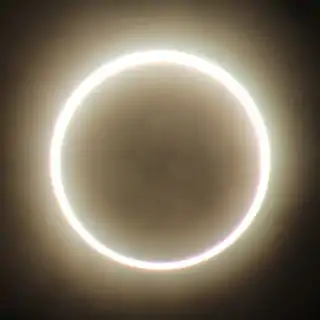| Solar eclipse of February 23, 1906 | |
|---|---|
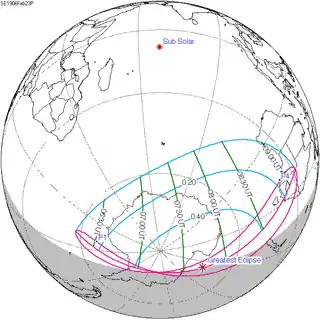 Map | |
| Type of eclipse | |
| Nature | Partial |
| Gamma | −1.2479 |
| Magnitude | 0.5386 |
| Maximum eclipse | |
| Coordinates | 71°24′S 170°18′W / 71.4°S 170.3°W |
| Times (UTC) | |
| Greatest eclipse | 7:43:20 |
| References | |
| Saros | 148 (15 of 75) |
| Catalog # (SE5000) | 9294 |
A partial solar eclipse occurred on February 23, 1906.[1][2][3] A solar eclipse occurs when the Moon passes between Earth and the Sun, thereby totally or partly obscuring the image of the Sun for a viewer on Earth. A partial solar eclipse occurs in the polar regions of the Earth when the center of the Moon's shadow misses the Earth.
Related eclipses
Solar eclipses 1902–1907
This eclipse is a member of a semester series. An eclipse in a semester series of solar eclipses repeats approximately every 177 days and 4 hours (a semester) at alternating nodes of the Moon's orbit.[4]
| Solar eclipse series sets from 1902–1907 | ||||
|---|---|---|---|---|
| Descending node | Ascending node | |||
| 108 | April 8, 1902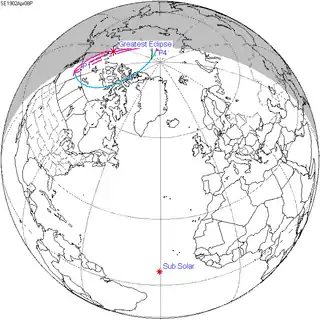 Partial |
113 | October 1, 1902 | |
| 118 | March 29, 1903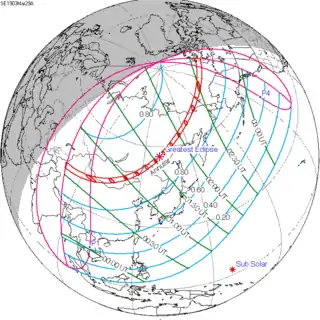 Annular |
123 | September 21, 1903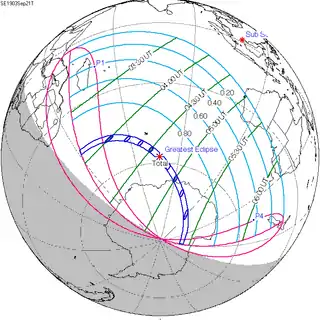 Total | |
| 128 | March 17, 1904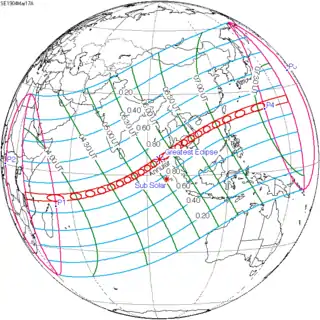 Annular |
133 | September 9, 1904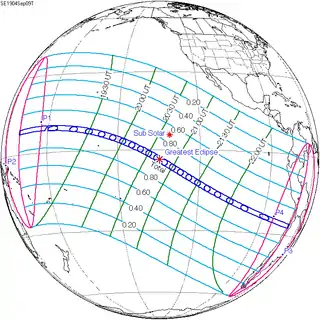 Total | |
| 138 | March 6, 1905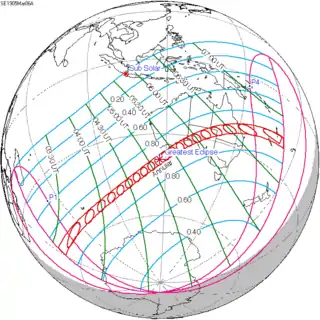 Annular |
143 | August 30, 1905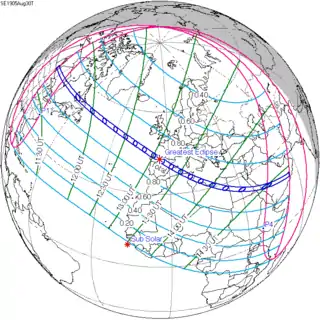 Total | |
| 148 | February 23, 1906 Partial |
153 | August 20, 1906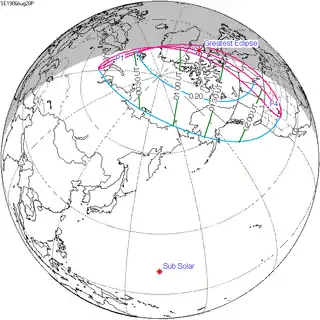 Partial | |
Notes
- ↑ "Page 37". The Albury Banner, Wodonga Express and Riverina Stock Journal. Albury, New South Wales, Australia. 1906-02-23. p. 37. Retrieved 2023-11-01 – via Newspapers.com.
- ↑ "Partial eclipse of the sun". The Daily Telegraph. Sydney, New South Wales, Australia. 1906-02-24. p. 12. Retrieved 2023-11-01 – via Newspapers.com.
- ↑ "Partial sun eclipse". The Age. Melbourne, Victoria, Victoria, Australia. 1906-02-24. p. 11. Retrieved 2023-11-01 – via Newspapers.com.
- ↑ van Gent, R.H. "Solar- and Lunar-Eclipse Predictions from Antiquity to the Present". A Catalogue of Eclipse Cycles. Utrecht University. Retrieved 6 October 2018.
References
- Earth visibility chart and eclipse statistics Eclipse Predictions by Fred Espenak, NASA/GSFC
External links
This article is issued from Wikipedia. The text is licensed under Creative Commons - Attribution - Sharealike. Additional terms may apply for the media files.
.jpg.webp)
